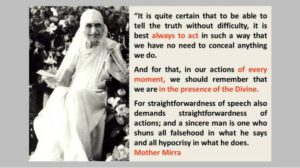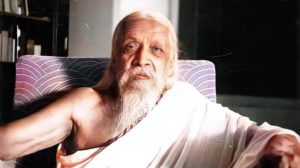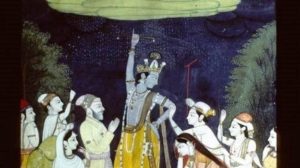Speaking Truth to Power – Through the enclosed stories Mother Mirra explains, that a sincere person does not need to be threatened or frightened into speaking the truth. Instead a sincere person speaks the truth because it is his very nature to be honest and forthright in all his dealings. The Mother brings out this nuanced teaching through the telling of 2 engaging stories, the first about King Solomon and his Fearsome Throne, and the second about Rishi Vasishtha’s (the guru of Lord Rama) courageous speaking of the truth before the powerful king Vishvamitra. Both these stories have been excerpted from Mother Mirra’s book: Words of Long Ago (Volume 2 of Mother’s Works).
Story 1: The Forced Speaking of Truth Before King Solomon’s Fearsome Throne
A Muslim writer, Abu Abbas, tells us of the glory of King Solomon, who reigned in Jerusalem, the holy city of the Hebrews. In his throne room there were six hundred seats, half of which were occupied by sages, the other half by Jinns or genies who assisted Solomon by their magic power.
Throughout the sittings of the Council, a multitude of great birds would appear at a word from the king and spread their wings to shade the people in the six hundred seats.
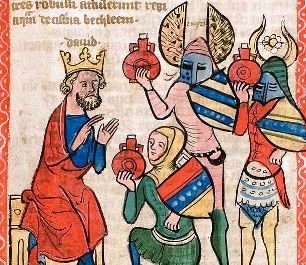
And at his command, each morning and evening, a powerful wind would arise, lifting up the whole palace and instantaneously transporting it a month’s journey away. In this way, the king was at hand to govern the distant lands that belonged to him.
Besides, Solomon made the most marvellous throne one could ever dream of. And this throne was designed in such a way that no one would dare to utter an untruth in the presence of the king.
It was made of ivory, inlaid with pearls, emeralds and rubies, and around it stood four golden date-palms on which the dates were also emeralds and rubies.
At the top of two of these palms were golden peacocks, and on the two others were golden vultures. On each side of the throne there were also two golden lions between two pillars of emerald. And golden vines bearing ruby grapes twined around the trunks of the trees.
The elders of Israel were seated at Solomon’s right hand and their seats were of gold, the genies sat at his left hand and their seats were of silver. When the king held his court of justice the people were allowed into his presence. And each time that a man bore witness on another, if he deviated ever so little from the truth, an amazing thing would happen.
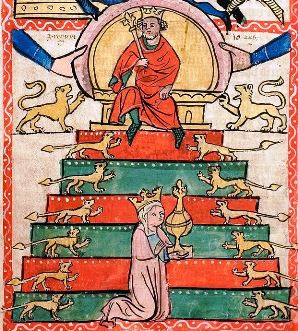
At the sight of him, the throne bearing the king, the lions, the palm-trees, the peacocks and the vultures, would instantly turn round on itself. Then the lions would thrust forward their claws, lashing the ground with their tails; the vultures and the peacocks would flap their wings.
And so the witnesses would tremble with terror and would not dare to tell a single lie.
And this was no doubt very convenient, and must have considerably lightened the king’s task. But fear is always a wretched thing, which consorts ill with truth. Even when by chance, as in the story of Abu Abbas, it forces a man to speak the truth, that does not make him truthful; for, at the very next moment, fear may also drive him to flatter someone and speak the untruth, as did the fox, who afraid that the lion would kill it, uttered false praise before the lion to escape. And that is what most often happens.
An honest man does not need the marvels of Solomon’s throne to learn to speak the truth. The throne of truth dwells within his own heart; the rectitude (righteousness) of his soul cannot but inspire him with words of rectitude. He speaks the truth not because he is afraid of a teacher, a master or a judge, but because truth is the characteristic of an upright man, the stamp of his nature.
Love of truth makes him face all fears. He speaks as he should, no matter what happens to him.
Story 2: Rishi Vashishtha’s Honest & Bold Speaking of the Truth to Vishvamitra
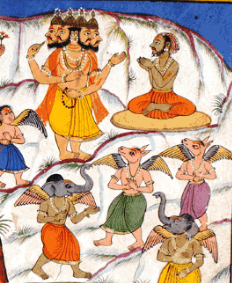
(A scene from the Mewar Ramayana, courtesy the British Library.)
A rich and mighty king named Vishvamitra, who longed for greater esteem, resolved to practise Tapasya (austerities) in order to rise from his own caste of Kshatriya (see Note) to the highest of all, that of a Brahmin (Brahmarshi – the seer who has known the Supreme).
He did all that he thought was needed and led a life of apparent austerity which made everyone say, “The king deserves to be a Brahmin.”
But the Brahmin Vashishtha did not think so, for he knew that Vishvamitra had acted out of vanity; his renunciation was not sincere. And so he refused to address him as a Brahmin.
In his fury the king had a hundred children of Vashishtha’s family put to death. But in spite of all his grief, Vashishtha persisted in his refusal to say what he did not think was true. So the king resolved to kill this truthful man as well. One night he went to Vashishtha’s hut to carry out the evil deed.
When he came near to the door, he heard the Brahmin talking with his wife, and as his own name was mentioned, he stopped to listen. Saintly and pure, full of forgiveness for him were the words he heard. This touched the king’s heart. Full of repentance he threw away his weapon, then went in and bowed at the hermit’s feet.
“Brahmarshi,” Vashishtha welcomed him affectionately,when seeing the king’s present state of mind.
“Why did you not acknowledge my Tapasya before?” Vishvamitra asked humbly.
“Because,” replied Vashishtha, “you claimed the title of Brahmin in the name of an arrogant power, but now that you are repentant, you come in the true spirit of a Brahmin.” Vashishtha knew how to speak the truth without fear. And he also spoke it without rancour.
Note on the Caste System
The rivalry between Vishvamitra and Vashishtha is captured in several different tales which are found scattered across various ancient texts such as the Ramayana, the Mahabharata, the Skanda Purana and the Vishnu Purana. This particular narration of Mother Mirra’s, is a combination of two or three of these scattered stories, with the first half of the story (involving the killing of Vashishtha’s 100 sons), being taken from the Ramayana.
Now the one very critical point to note, as the story of Vishvamitra itself tell us, is that in all these ancient texts the word ‘caste’ was never meant to imply a rigid and hereditary transmission of duties or privileges, which it later, due to the passage of history got distorted into. As a matter of fact there is actually no word in Sanskrit which translates into caste. Rather, the equivalent word is varna, which means “type” and it refers to what kind of a person one is – what is the state of one’s mind and consequently what is the state of one’s consciousness.
For as the Ramayana relates, when Vishvamitra was a Kshatriya King, he existed in the ordinary state human consciousness, with his mind being dominated by many ego-driven Rajasic and Tamasic tendencies. However when through the severe penance of introspection, self-refinement and unbreakable devotion to God, Vishvamitra was able to renounce his egotistical tendencies and reform his thoughts, words and deeds into the purity of Sattva, then he was able to attain to the infinite God-consciousness, and become a true Brahmin or a Brahmarshi, meaning a sage who is a Knower of Brahman (God the Absolute). In this way Vishvamitra was able to change his mental type, his varna or “caste”.
In fact when Vishvamitra first came to Vashishtha, despite having performed severe austerities to control his mind, a streak of egotistical vanity still remained in him. Therefore Vashishtha refused to recognize him as a Brahmarshi. But upon listening to the words of forgiveness of Vashishtha, when this last barrier of Vishvamitra’s ego finally melted away, then Vashishtha recognized him as a true Brahmarshi or Knower of God the Absolute.
 PART 4: What is Courage? Persevering Forward In Spite of Difficulties – What is Courage? Mother Mirra explains that courage is the ability to persevere forward, braving storms, disappointments and difficulties.
PART 4: What is Courage? Persevering Forward In Spite of Difficulties – What is Courage? Mother Mirra explains that courage is the ability to persevere forward, braving storms, disappointments and difficulties.
![]() PART 2: Speaking Truth to Power | Vibhishan Risks His Life To Stand Up To Ravana – Story from the Ramayana illustrating Vibhishan’s courage to stand up to Ravana’s deplorable abduction of Sita & make him listen to the voice of truth.
PART 2: Speaking Truth to Power | Vibhishan Risks His Life To Stand Up To Ravana – Story from the Ramayana illustrating Vibhishan’s courage to stand up to Ravana’s deplorable abduction of Sita & make him listen to the voice of truth.


